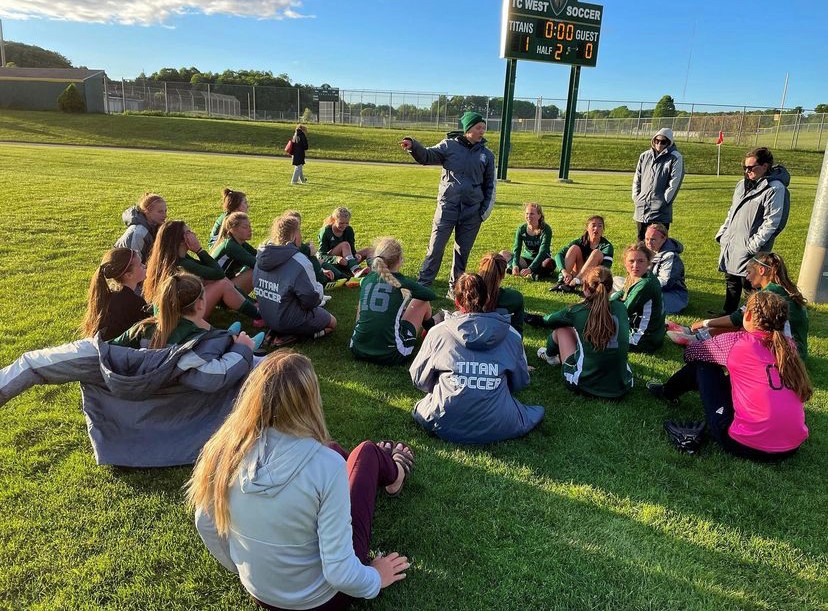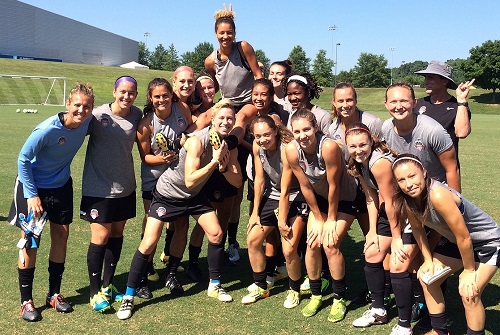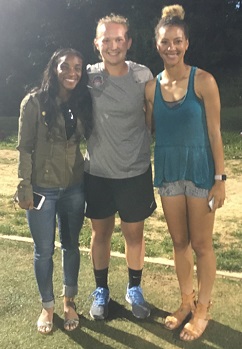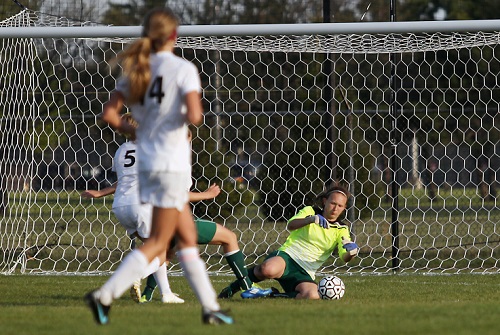
TC West Standout Renews Ties to Titans, Cheers Past Teammates' Gold Pursuit
By
Tom Spencer
Special for MHSAA.com
July 16, 2021
Savanna Wojtanowski was made here. She played here. She stayed here — except for stints in Washington, D.C., where international soccer players joined her.
 Now she’s back as a high school soccer coach.
Now she’s back as a high school soccer coach.
While lots of faces familiar to United States and Canadian television viewers and soccer fans are expected at the Olympic Games in Tokyo, some of those players will be personally familiar to Wojtanowski.
Wojtanowski played alongside a handful of current and recent players on the U.S. and Canadian women’s teams after serving as four-year starting goalie for Traverse City West and during a college career that began with two seasons at Ferris State and concluded with her final two at Michigan State in 2016 and 2017. During her time with the Spartans, Wojtanowski spent two offseasons with the reserve team for the Washington Spirit, one of the original eight teams when the National Women’s Soccer League (NWSL) was formed in 2012.
At West, Wojtanowski was named second team all-conference as a junior and senior, as well as first team all-district, first team all-region and all-state honorable mention her senior season in 2013. West winning the Big North Conference title that spring remains her favorite memory from high school soccer – and she quickly has matched that achievement as a coach, leading West to the BNC championship this past spring in her first season after taking over the program.
Wojtanowski is looking for the U.S. national team to come out with a vengeance after the disappointment of the 2016 Olympic Games in Brazil. There the U.S. fell to Sweden in a semifinal shootout, which meant failing to reach the gold medal match for the first time since women’s soccer was introduced to the Olympics in 1996 in Atlanta.
Sweden is the U.S.’s opening-game opponent July 21 in Tokyo.
“I believe there is a lot of revenge being chased after the Rio Olympics,” the 25-year-old former keeper said. “I was with the Spirit during Rio, and when the team returned from the Olympics, the sense of disappointment was felt for a long time.
 “I believe going into this year's Olympics, we will see a different type of fire displayed from the USWNT.”
“I believe going into this year's Olympics, we will see a different type of fire displayed from the USWNT.”
Wojtanowski won’t see former Washington Spirit teammate Diana Matheson of Canadian fame and Estelle Johnson of Cameroon playing in Tokyo. Matheson recently announced her retirement after 18 years representing Canada’s national team. Johnson and her teammates lost a playoff with Chile for the last of 16 slots in the Olympics.
 Wojtanowski feels fortunate that she had the chance to compete with and against the women trying to claim gold at Tokyo.
Wojtanowski feels fortunate that she had the chance to compete with and against the women trying to claim gold at Tokyo.
“During college I was able to play two years on the Washington Spirit reserves, which opened the door to the pro side of the game,” she said. “I was fortunate enough to be one of two college players training full-time with the pro squad for those two summers.
“Having the opportunity to play alongside some USWNT women and the Canada women was such a great experience.”
Wojtanowski played with current U.S. roster players Crystal Dunn and Kristie Mewis. The current Canadians she played with are Stephanie Labbe and Shelina Zadorsky. Labbe was Canada’s starting goalkeeper in Rio.
Dunn, though, stands out most to Wojtanowski. Dunn was with the Spirit but now plays for Portland. She has 24 goals and 19 assists in 116 appearances for the USWNT as primarily a defender.
“(Dunn) was such a treat to play with …. her humor, attitude, and training mentality is something I will forever remember,” Wojtanowski said. “She was constantly dancing, laughing, and having a great time at training, but when it was time to get serious she would get the job done.”
Wojtanowski also had the tough job of trying to stop U.S. standout Rose Lavelle during Lavelle’s time starring for Wisconsin. The past Badgers standout and now-Washington Spirit midfielder has 14 goals and nine assists in 56 appearances for the U.S.
Wojtanowski began her collegiate career with two seasons at Ferris State University. After transferring to MSU, she played two more seasons and as a junior in 2016 tied the MSU single-game record with 14 saves against then-No. 16 Penn State. She earned a bachelor’s degree in business with a focus on administration and management and a master’s certificate in supply chain management and procurement. She returned home to start the next chapters of life, and she works as a supply chain buyer fulltime along with her guidance of the Titans.
She’s thrilled to be back at her high school alma mater, which she guided to an overall 10-4-1 record this spring, with the Titans eventually falling to Midland Dow in a Division 1 District Final.
 “I wanted to give back to the community,” said Wojtanowski, who previously had coached at the club level in Lansing. “West has always had a very special place in my heart ever since graduation.
“I wanted to give back to the community,” said Wojtanowski, who previously had coached at the club level in Lansing. “West has always had a very special place in my heart ever since graduation.
“When this opportunity presented itself, I knew I had to take the opportunity to be a Titan again,” she continued. “It has been a special experience to coach the program that I grew up with.”
Wojtanowski wants to instill a family-based culture in the Titans program, something she came to know and love while at Michigan State.
“The biggest thing for me is growing them as individuals both on and off the soccer field,” she said.
Wojtanowski believes girls high school and women’s soccer in this country have changed for the better since she played. And, she’s not the least bit surprised by the consistent success of the USWNT.
“The women's game in the US has grown significantly since I started playing soccer in 2000,” Wojtanowski noted. “Our farm systems here in the U.S. along with club, college, and other programs feed a constantly-elite level of players through the USWNT system.”
2020-21 Made in Michigan
July 8: Caro Champs Find Common Ground Again as Mental Health Providers - Read
June 28: Michigan's Minor Leaguers Making Up for Lost Season - Read
PHOTOS: (Top) Savanna Wojtanowski leads a halftime discussion this spring with her Traverse City West varsity. (Middle) Wojtanowski, second row standing far right in group photo, trained two seasons with the Washington Spirit’s reserves; the Spirit first team included U.S. national teamer Crystal Dunn (left in second photo) and Cameroon national teamer Estelle Johnson (far right). (Below) Wojtanowski makes a save for West against Traverse City Central in 2012. (Top photo by Daisy Kinney, middle courtesy of Savanna Wojtanowski and below courtesy of the Traverse City Record-Eagle.)

- Baseball
- Girls Soccer
- Softball
- Girls Track & Field
- Boys Track & Field
- Boys Tennis
- Girls Tennis
- Girls Golf
- Boys Golf
- Girls Lacrosse
- Boys Lacrosse
- MHSAA News
Lacrosse Finals Move to U-M Among Headlines as Spring Sports Ramp Up
By
Geoff Kimmerly
MHSAA.com senior editor
April 9, 2024
The Girls & Boys Lacrosse Finals will be played at University of Michigan Lacrosse Stadium for the first time, one of the most notable changes for this season as sports ramp up for more than 100,000 athletes anticipated to participate this spring for Michigan High School Athletic Association member schools.
The MHSAA sponsors postseason competition each spring in baseball, girls and boys lacrosse, girls soccer, softball, girls and boys track & field, boys golf (Lower and Upper Peninsula) and girls golf (UP), and girls (LP) and boys (UP) tennis.
The U-M Lacrosse Stadium opened for competition in 2018 and seats 2,000 spectators. The Girls Lacrosse Finals will be played Friday, June 7, with Division 1 at 4 p.m. and Division 2 at 7 p.m. The Boys Lacrosse Finals will be played the following day, June 8, with Division 2 at 11 a.m. and Division 1 at 2 p.m.
Girls lacrosse also has a significant format adjustment this season, as games will be played with four 12-minutes quarters instead of the previous two halves, in part to allow coaches more opportunities to provide direct instruction during a game. Two more rules changes are expected to improve flow of play – players awarded a free position outside of the critical scoring area no longer must come to a stop and settled stance before self-starting, and false start penalties outside the critical scoring area have been eliminated.
Several more rules changes will be noticeable this spring:
In boys lacrosse, a change was made to enhance player safety. Play will stop immediately any time a player’s helmet comes off, and that player may not return until the next dead ball after play continues.
Fair and legal starts are a continued emphasis for track & field, and a rule change will allow for movement before the start of the race as long as a competitor does not leave their mark with a hand or a foot after the “set” command, or make forward motion before the starting device is activated.
A significant rule change in softball alters pitch delivery mechanics. The pitcher may now have both feet off the ground at the same time when releasing the ball as long as both feet remain within the 24-inch width of a pitching plate and the pitcher does not replant the pivot foot before delivering the pitch.
Another change in softball requires that a playbook/playcard be worn on the wrist or kept in a back pocket to reduce distractions. If worn by the pitcher, the equipment must be worn on the non-pitching arm. Similarly in baseball, a wristband with plays or instructions will be permitted but must be a single, solid color, and for pitchers may not contain the colors white or gray or be otherwise distracting. Baseball players must wear this wristband on the wrist or forearm, and pitchers may wear one only on their non-pitching arm.
Also in baseball, a rule change allows for one-way communication devices worn by the catcher to receive instructions from the dugout while on defense, for the purpose of calling pitches. The coach must be inside the dugout/bench area to use the communication device.
Golfers now are required to participate in at least four competitions for the high school team prior to representing that school team in an MHSAA Regional or Final. Those four regular-season competitions may be 9 or 18-hole events.
In tennis, for the first time in Lower Peninsula play, a No. 1 doubles flight from a non-qualifying team will be able to advance from its Regional to Finals competition. To do so, that No. 1 doubles flight must finish first or second at its Regional, and the No. 1 singles player from that team also must have qualified for the Finals individually by finishing first or second in Regional play.
On the soccer pitch, two officiating-related changes will be especially noticeable. Officials now may stop the clock to check on an injured player without that player being required to leave the match – previously that player would have to sub out. Also, categories for fouls have been redefined: careless (which is a foul but does not receive a card), reckless (a foul with a yellow card) and excessive force (foul with red card).
The 2023-24 Spring campaign culminates with postseason tournaments, as the championship schedule begins with the Upper Peninsula Girls & Boys Golf and Boys Tennis Finals during the week of May 27 and wraps up with Girls Soccer, Baseball and Softball Finals on June 15. Here is a complete list of winter tournament dates:
Baseball
Districts – May 23-June 1
Regional Semifinals – June 5
Regional Finals, Quarterfinals – June 8
Semifinals – June 13-14
Finals – June 15
Golf
LP Boys Regionals – May 28-June 1
UP Girls & Boys Finals – May 29, 30, 31 or June 1
LP Boys Finals – June 7-8
Boys Lacrosse
Pre-Regionals – May 10-15
Regionals – May 16-29
Quarterfinals – May 31 or June 1
Semifinals – June 5
Finals – June 8
Girls Lacrosse
Pre-Regionals – May 16-18, or May 20
Regionals – May 22-June 1
Semifinals – June 5
Finals – June 7
Girls Soccer
Districts – May 22-June 1
Regionals – June 4-8
Semifinals – June 11-12
Finals – June 14-15
Softball
Districts – May 23-June 1
Regionals – June 8
Quarterfinals – June 11
Semifinals – June 13-14
Finals – June 15
Tennis
LP Girls Regionals – May 15-18
UP Boys Finals – May 29, 30, 31 or June 1
LP Girls Finals – May 31-June 1
Track & Field
Regionals – May 16-18
Finals – June 1

